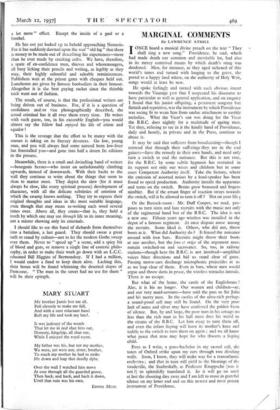MARGINAL COMMENTS
By LAWRENCE ATHILL
IONCE heard a musical divine preach on the text " They shall sing a new song." Providence, he said, which had made death our common and inevitable lot, had also in its mercy contrived means by which death's sting was deadened. Men, for instance, as they aged sickened of this world's tunes and turned with longing to the grave, the portal to a happy land where, on the authority of Holy Writ, songs would at least be new.
He spoke feelingly and turned with such obvious intent towards the Vicarage pew that I suspected his discourse to have particular as well as general application, and on enquiry I found that his junior offspring, a persistent songster but flattish and repetitive, was the instrument by which Providence was seeing fit to wean him from undue attachment to earthly melodies. What the Vicar's son was doing for the Vicar the B.B.C. does nightly for a multitude of ageing men. Yet they, refusing to see in it the kindly hand of Providence, daily and hourly, in private and in the Press, continue to abuse it.
It may be said that sufferers from broadcasting—though I contend that through their sufferings they are in the end gainers—have the remedy in their own hands, and need only turn a switch to end the nuisance. But this is not true, for the B.B.C. by some subtle hypnosis has recruited in its support not only our wives and children but in some cases Competent Authority itself. Take the factory, where the emission of assorted noises by a loud-speaker has been found to speed production. Authority installs the apparatus and turns on the switch. Brains grow bemused and fingers nimbler. But if the errant finger of reaction strays towards the switch, will it be allowed to turn it off ? Not on your life !
Or the Barrack-room : Mr. Duff Cooper, we read, pro- poses to turn siren and lure recruits with the music not only of the regimental band but of the B.B.C. The idea is not a new one. Fifteen years ago wireless was installed in the depot of a famous regiment. 4.t once dispute arose among the recruits. Some liked it. Others, who did not, threw boots at it. What did Authority do ? It fenced the nuisance around with iron bars. Recruits might throw their boots at one another, but the fans et origo of the argument must remain switched-on and sacrosanct. So, too, in railway stations—though here the B.B.C. is not involved—amplified voices blare directions and bid us stand clear of gates. Passing motor-cars discharge microphonic projectiles at us as we leap clear of them. Even in bars, where men would argue and throw darts in peace, the wireless tentacles intrude. There is no escape.
But what of the home, the castle of the Englishman ? Alas, it is his no longer. Our women and children—ay, and our very maid-servants—have sold the pass to Sir John and his merry men. In the castles of the ultra-rich perhaps a sound-proof cell may still be found. On the very poor lack of notes and silver may have conferred the golden boon of silence. But, by and large, the poor man in his cottage no less than the rich man in his hall must dree his weird to the strains of the B.B.C. Let him essay to turn them off, and even the infant lisping will leave its mother's knee and toddle to the switch to turn them on again ; and we all know what peace that man may hope for who thwarts a lisping child.
Even as I write, a grass-bachelor in my sacred cell, the tones of Oxford strike upon my ears through two dividing walls. Soon, I know, they will make way for a transatlantic orchestra ; and that in turn will yield to the bleatings of the vaudeville, the Stadteskalb, as Professor Knappsche (was it not ?) so splendidly translated it. So it will go on until at last the shouting dies away and I am left to muse in grateful silence on my latter end and on this newest and most potent instrument of Providence.














































 Previous page
Previous page